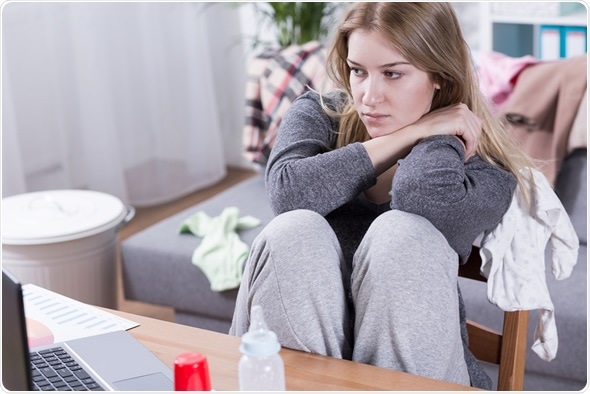Both prenatal and postnatal anxiety have significant effects on the health of the mother and baby, as well as of the entire family, including the spouse. Both physical and mental health may be affected as a result of pregnancy-related anxiety.

Image Credit: Photographee.eu / Shutterstock
Adverse Effects of Non-Treatment of Anxiety
The adverse effects of not treating anxiety during and after pregnancy properly are many, such as:
- Poor self-care
- Missing appointments and not getting proper medical care
- Using illegal or harmful substances which can harm both the mother and baby
- Escalating anxiety which may need intensive treatment, possibly putting the baby at higher risk of drug toxicity
- Having to be admitted for treatment
- Having a low birth weight baby with its associated health risks
- Postpartum depression
- Lack of proper mother-infant bonding
- Long-term neurological, emotional, and behavioral effects on the child’s development
For these reasons, once a woman is diagnosed with prenatal or postnatal anxiety, it is important to get treated for it. Various approaches are possible, depending on each person’s situation.
Treatment Approaches
Various approaches are possible depending on each person’s situation.
Self-Care
Mild anxiety is often relieved with self-care measures such as:
- Practicing a positive outlook on life with emphasis on what is going right for the individual
- Regular exercise every day
- Nutritious well-cooked food at the right times
- Making time to relax
- Sharing problems with people who are close to the individual and who are mature enough to help them
- Opting out of other commitments which take up too much time and energy when the individual has a new baby to look after
- Delegating work to others who can help, such as shopping for food or cleaning the house
- Joining a support group if necessary
Psychotherapy
Various techniques may be used to help anxious parents.
Cognitive-Behavioral Therapy (CBT)
This is aimed at helping the patient to recognize, control, and alter anxious thoughts in response to any given stimulus. It is directed at both understanding the thought pattern and changing the behavior of the patient. Over the long term, patients learn to challenge the truth of the anxiety-producing assumptions that underlie their original anxious responses. In many studies, it has been found that a combination of CBT with medication is most effective in reducing anxiety to normal levels.
Other techniques include systematic desensitization, exposure and response treatment, and modeling therapies where the patient can learn to face and overcome her anxiety.
Talk Therapy
Also called psychodynamic therapy or emotion-based therapy, this is directed at helping to uncover the roots of anxiety, which may lie in childhood experiences. It takes longer to complete, but is more attractive to the patients. This may be included in later versions of CBT.
Medications
Some medications are helpful during anxiety related to pregnancy. If a woman is already on medication, it is best to continue it except on medical advice. Premature discontinuation may cause a relapse, or worsening of anxiety. Any doubts should be talked over with the healthcare provider. Most medications taken for anxiety have been in use for many years for pregnant and non-pregnant women, and are thought to be safe at this time. Those which are known to have the potential to harm some babies will be substituted under medical supervision.
Factors which may be considered before starting or changing a medication include:
- Past history of mental illness
- Rate and speed of relapse after discontinuing
- Safety of current medications and their efficacy
References
Further Reading
Last Updated: Feb 27, 2019